when引导的时间状语从句(1)
用when引导时间状语从句的句型结构搭配
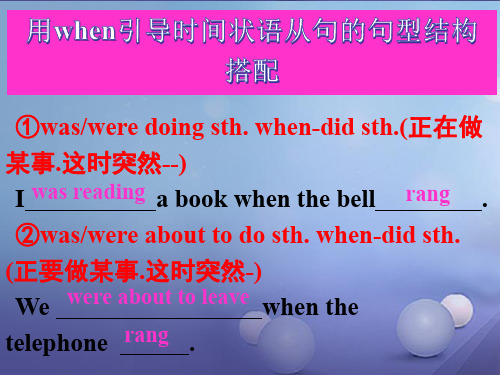
⑥It the first/second/third-time+ that did / had\have\ has + done 结构中,that-从句通常用过去完成时,有时也用一 般过去时,有时若有包括现在在内的时间状语,偶尔还可用 现在完成时:
I was lucky because that was the second time I(had) visited Japan that year.我很幸运,那是我那年第二次访问日本.
I was about to go out when it began to rain.
2.我正在做作业他就打电话给我。
I was doing my homework when he phoned me.
3.他一到学校就下雨。
No sooner had he got to school had he got to school when it began to rain. He had no sooner got to school than it began to rain.
It was the first time this year that hhe adn’t [hasn’t] work on a Saturday.这是今年来他第一次在星期六不上班.
when引导的时间状语从句(1) PPT
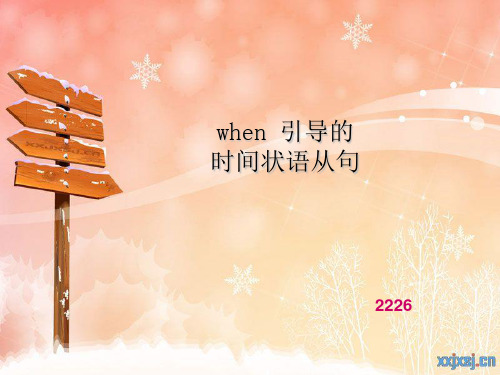
2226
•After the teacher came in, the students became quiet. •When the teacher came in, the students became quiet.
•After he finished his homework, he went to play basketball. •When he finished his homework, he went to play basketball. •Before I got to the airport, the guests had left. •When I got to the airport, the guests had left.
Use “when” to practice.
➢After the students became quiet, the teacher came in. When the students became quiet, the teacher came in.
➢After I went to Beijing, I visited Tian Anmen Square. When I went to Beijing, I visited the Tian Anmen Square.
➢Before I got to the airport, the guests had left. When I got to the airport, thee sentences with the correct tense for the verbs in brackets.
3. When we _w_e_r_e_w__a_tc_h_in_g_ (watch) TV, the telephone ___r_a_n_g____ (ring).
when引导的时间状语从句
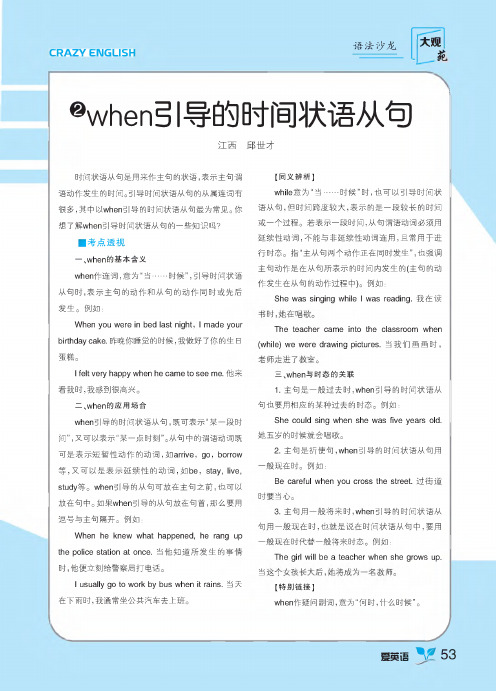
C R A Z Y EN G LISH 语法沙龙大观苑!when引导的时间状语从句江西邱世才时间状语从句是用来作主句的状语,表示主句谓语动作发生的时间。
引导时间状语从句的从属连词有 很多,其中以when引导的时间状语从句最为常见。
你 想了解when引导时间状语从句的一些知识吗?■考点透视—、when的基本含义when作连词,意为"当+ ■■ + ■■时候”,引导时间状语从句时,表示主句的动作和从句的动作同时或先后 发生。
例如:When you were in bed last night,I made your birthdaycake.昨晚你睡觉的时候,我做好了你的生曰蛋糕。
Ifeltveryhappyw henhecam etoseem e■他来看我时,我感到很高兴。
二、when的应用.合when引导的时间状语从句,既可表示"某一段时间”,又可以表示"某一点时刻”。
从句中的谓语动词既 可是表示短暂性动作的动词,如arrive,go,borrow 等,又可以是表示延续性的动词,如be,stay,live, study等。
when引导的从句可放在主句之前,也可以 放在句中。
如果when引导的从句放在句首,那么要用 逗号与主句隔开。
例如:When he knew what happened,he rang up the police station at once■当他知道所发生的事情 时寸,他便立刻给警察局打电话。
I usually go to work by bus when it rains■当天 在下雨时,我通常坐公共汽车去上班。
【同义辨析】while意为"当+ ■■ + ■■时候”时,也可以引导时间状语从句,但时间跨度较大,表示的是一段较长的时间 或一个过程。
若表示一段时间,从句谓语动词必须用 延续性动词,不能与非延续性动词连用,且常用于进行时态。
用when引导时间状语从句的句型结构搭配

No sooner had we finished the papers than class was over.
7
2
Hardly had we got in the crops when it began to rain.我们
已收完庄稼就开始下雨。
I had no soonercome into the room than the door was closed. 我一进屋门就关了。 Hardly had I got into the room when it began to rain. 我一 进屋门就下雨。
--正语序:I had hardly got into the room when it began to rain. 我一进屋门就下雨。 No sooner had I got into the room than it began to rain. 我 一进屋门就下雨。
--正语序:I had no sooner got into the room than it began to rain.我一进屋门就下雨。
Japan that year.我很幸运,那是我那年第二次访问日本. It was the first time this year that he hadn’t [hasn’t] woonrkaed
Saturday.这是今年来他第一次在星期六不上班. This is the first time I have been here. 这是我第一次来
这里。 It'll be the first time I
have spoken in public. 这将是我
第一次在公共场所演讲。
5
状语从句
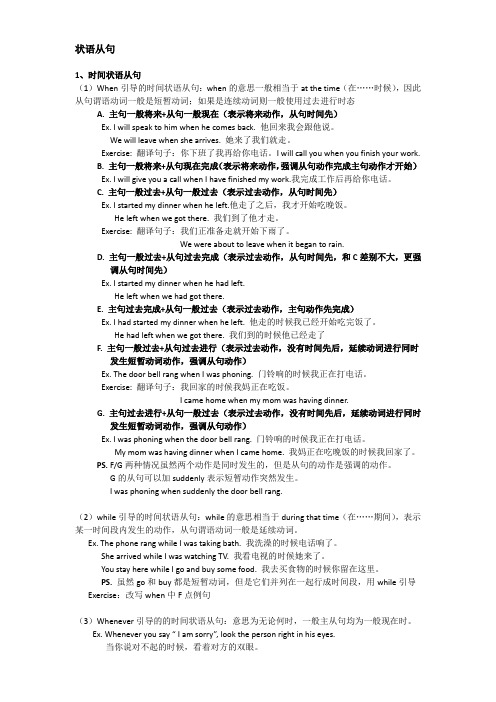
状语从句1、时间状语从句(1)When引导的时间状语从句:when的意思一般相当于at the time(在……时候),因此从句谓语动词一般是短暂动词;如果是连续动词则一般使用过去进行时态A. 主句一般将来+从句一般现在(表示将来动作,从句时间先)Ex. I will speak to him when he comes back. 他回来我会跟他说。
We will leave when she arrives. 她来了我们就走。
Exercise: 翻译句子:你下班了我再给你电话。
I will call you when you finish your work.B. 主句一般将来+从句现在完成(表示将来动作,强调从句动作完成主句动作才开始)Ex. I will give you a call when I have finished my work.我完成工作后再给你电话。
C. 主句一般过去+从句一般过去(表示过去动作,从句时间先)Ex. I started my dinner when he left.他走了之后,我才开始吃晚饭。
He left when we got there. 我们到了他才走。
Exercise: 翻译句子:我们正准备走就开始下雨了。
We were about to leave when it began to rain.D. 主句一般过去+从句过去完成(表示过去动作,从句时间先,和C差别不大,更强调从句时间先)Ex. I started my dinner when he had left.He left when we had got there.E. 主句过去完成+从句一般过去(表示过去动作,主句动作先完成)Ex. I had started my dinner when he left. 他走的时候我已经开始吃完饭了。
He had left when we got there. 我们到的时候他已经走了F. 主句一般过去+从句过去进行(表示过去动作,没有时间先后,延续动词进行同时发生短暂动词动作,强调从句动作)Ex. The door bell rang when I was phoning. 门铃响的时候我正在打电话。
When 引导时间状语从句
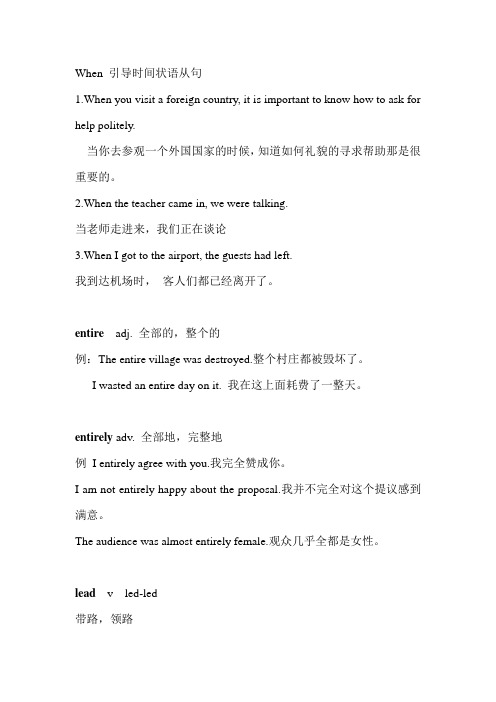
When 引导时间状语从句1.When you visit a foreign country, it is important to know how to ask for help politely.当你去参观一个外国国家的时候,知道如何礼貌的寻求帮助那是很重要的。
2.When the teacher came in, we were talking.当老师走进来,我们正在谈论3.When I got to the airport, the guests had left.我到达机场时,客人们都已经离开了。
entire adj. 全部的,整个的例:The entire village was destroyed.整个村庄都被毁坏了。
I wasted an entire day on it. 我在这上面耗费了一整天。
entirely adv. 全部地,完整地例I entirely agree with you.我完全赞成你。
I am not entirely happy about the proposal.我并不完全对这个提议感到满意。
The audience was almost entirely female.观众几乎全都是女性。
lead v led-led带路,领路The receptionist led the way to the boardroom相通The wire led to a speaker通向,通往Which door leads to the yard?lead to sth导致Eating too much sugar can lead to health problems. lead sb (to sth)使得出,引导What led you to this conclusion?过某种生活He lead a quiet life.curious 英['kjʊərɪəs] adj 好奇的,有求知欲的;古怪的;爱挑剔的They were very curious about the people who lived upstairs.There was a curious mixture of people in audience.beaten英['bi:t(ə)n]•adj. 被打败了的;筋疲力竭的;踏平的•v. 打败(beat的过去分词)beaten track 常规;惯例;踏出来的路,踏平的路off the beaten track 鲜有人涉足地; 独辟蹊径; 偏僻地; 不走寻常路follow the beaten track 因循守旧例:I want to do something off the beaten track.dive英[daiv]•vi. 潜水;跳水;俯冲;急剧下降•n. 潜水;跳水;俯冲;扑例:He tried to escape by diving into a river.(他企图跳入河中逃走)They dived into a taxi.(他们冲进了出租车。
When引导的时间状语从1
When 引导的时间状语从句、宾语从句和定语从句
1.when :“当……的时候”,引导的时间状语从句,当主句是一般将来时,when引导的从句要用一般现在时;when 引导其他时态的时间状语从句时,从句时态与主句保持一致。
如:
We will tell him our decision when he is free tomorrow.
Mom was cooking dinner when I got home yesterday.
2.when:“什么时候”,引导宾语从句,从句要用陈述句的语序,时态与主句保持一致。
如:
He asked me when I would leave for Shanghai.
3.when 作关系副词表示时间,在定语从句中作时间状语。
相当于in which 或on which如:
People always remember the year when they got married.
The day when Beijing held the 29th Olympics is August8th,2008.。
when引导的时间状语从句
Let’s read together
1.当他打开门时,他看到了这只鸟。 He saw the bird when he opened the door.
主句 从句
=When he opened the door, he saw the bird.
从句 主句
2.当她六岁时,她会下棋。 She could play chess when she was six years old.
•After he finished his homework, he went to play basketball.
•When he finished his homework, he went to play basketball. •Before I got to the airport, the guests had left. •When I got to the airport, the guests had left.
动词填空 1.When he _______(be)nine years old, he could swim. was 2.John could ____(can) draw a horse when he was in Grade One. 3.The boy could play _____(play) the guitar at he age of seven. 4.I started ________ learning (learn) the song last year. 5.Please stop _______ talking (talk), I want to sleep. live 6.They’d liketo _________( live) in the hotel this evening. 7.They like _________( drinking drink) tea in the morning. 8.It took them an hour ________(play) volleyball yesterday. to play 9. Jack spends 30 minutes reading _____ (read) newspapers every day. 10.He forgot _________(tell) me the news just now, so I to tell didn’t know it. 11. The next day he ________(leave) the hotel. left 12. He has fun listening ________(listen) to music in the morning. 13. He __________(drive) to the museum in 2009. drove
when 引导的时间的状语从句
说到 when 引导的时间状语从句,不得不提起 as 和 while一、 when 可以和延续性动词连用, 也可以和短暂性动词连用; 而 while 和 as 只能和延续性动词连用。
① Why do you want a new job when youve got such a good one already?(get 为短暂性动词你已经找到如此好的工作,为何还想再找新的?② Sorry , I was out when you called me. (call 为短暂性动词对不起,你打电话时我刚好外出了。
③ Strike while the iron is hot. (is 为延续性动词,表示一种持续的状态趁热打铁。
④ The students took notes as they listened. (listen 为延续性动词学生们边听课边做笔记。
二、 when 从句的谓语动词可以在主句谓语动作之前、之后或同时发生; while 和 as 从句的谓语动作必须是和主句谓语动作同时发生。
1.从句动作在主句动作前发生,只用 when 。
① When he had finished his homework, he took a short rest. (finished 先发生当他完成作业后,他休息了一会儿。
② When I got to the airport, the guests had left. (got to后发生当我赶到飞机场时,客人们已经离开了。
2.从句动作和主句动作同时发生,且从句动作为延续性动词时, when , while , as 都可使用。
① When /While /As we were dancing, a stranger came in. (dance 为延续性动词当我们跳舞时,一位陌生人走了进来。
② When /While /As she was making a phonecall, I was writing a letter. (make 为延续性动词当她在打电话时,我正在写信。
when引导的时间状语从句用法 有哪些用法
when引导的时间状语从句用法有哪些用法when引导的从句的谓语动词可以是延续性的动词,可以是瞬间动词。
并且when有时表示“就在那时”。
when引导的时间状语从句用法有哪些用法1when引导的时间状语从句用法1.在过去,when从句和主句的动作先后发生解释:表示在过去,主句和从句包含的动作先后发生了,或者主句或从句的动作先发生。
句子结构:when从句和主句都用过去式。
主句过去式常用was(were) about to,was(were) on the point 等词组。
2.在过去,主句动作发生时,when从句动作正进行解释:表示在过去,当主句的包含动作发生时,从句的动作在当时也正在进行。
此类句子主句动词为瞬间性,从句动词为延续性。
句子结构:when从句用过去进行时,主句用过去式。
3.在过去,when从句动作发生时,主句动作正进行解释:表示在过去,当从句的动作发生时,主句的动作在当时也正在进行。
此类句子主句动词为延续性,从句动词为瞬间性。
句子结构:when从句用过去式,主句用过去进行时。
4.在过去,when从句动作发生时,主句动作已完成解释:表示在过去,当从句包含的动作发生时,主句的动作在从句动作发生之前已经完成了。
句子结构:when从句用过去式,主句用过去完成时。
2时间状语从句用表示时间的连词连接一个句子作状语,这样的主从复合句就是时间状语从句。
连接时间状语从句的连接词有:when, before, after, while, as soon as, until, since...... 这里要注意一点的是,如果主句是一般将来时,从句只能用一般现在时表示将来意义。
由when,while引导的时间状语从句。
例如:Strike while the iron is hot.趁热打铁。
When you think you know nothing, then you begin to know something.当你以为自己一无所知的时候,你就是在开始知道一些事物了。
- 1、下载文档前请自行甄别文档内容的完整性,平台不提供额外的编辑、内容补充、找答案等附加服务。
- 2、"仅部分预览"的文档,不可在线预览部分如存在完整性等问题,可反馈申请退款(可完整预览的文档不适用该条件!)。
- 3、如文档侵犯您的权益,请联系客服反馈,我们会尽快为您处理(人工客服工作时间:9:00-18:30)。
After I went to Beijing, I visited Tian Anmen Square.
When I went to Beijing, I visited the Tian Anmen Square. Before I got to the airport, the guests had left. When I got to the airport, the guests had left.
•I was watching TV. •My sister was in the shower .
•When I was watching TV, my sister was in the shower .
•My brother was doing his homework.
•The telephone was ringing.
•When the telephone rang, my brother was doing his homework.
“at the same time”
When I got to the airport, the guests had left. “when” means “before” When I went to Beijing, I visited the Tian Anmen Square. “when” means “after” When we were dancing, a stranger came in.
•When he finished his homework, he went to play basketball. •Before I got to the airport, the guests he guests had left.
3. When we ____________ were watching (watch) TV, the telephone rang __________ (ring).
were dancing (dance), a stranger __________ came 4. When we ___________ (come) in.
“when” means “at the same time”
Use “when” to practice.
After the students became quiet, the teacher came in. When the students became quiet, the teacher came in.
What were your families doing when you were doing your homework? Please write 3 sentences with “when” to describe.
林雪 222010310011126
•After the teacher came in, the students became quiet. •When the teacher came in, the students became quiet.
•After he finished his homework, he went to play basketball.
Complete the sentences with the correct tense for the verbs in brackets.
1. When John ________ arrived (arrive), I ___________ was cooking (cook) dinner. came was reading 2. When she ________ (come) into my room, I __________ (read) a book.
